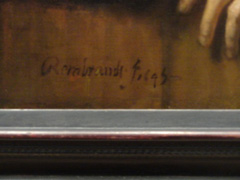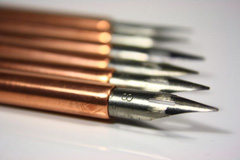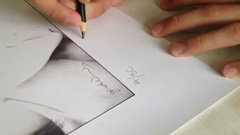| SIGNING AND AUTHENTICATING YOUR ARTWORK |
 |
|
Signing your art can seem deceptively simple. We’ve all seen signatures in some form or another: crisp and clear in corners, scribbled on backs of canvas, a tell-tale starry speck, and in some cases, no signature at all. In reality, signing your name on your artwork is an integral and important part of your piece, and requires careful consideration and thought. A signature, whether it be on the front or on the back (or wherever you choose it to be) is the final touch that makes your work complete.
|

|
| WHY IS IMPORTANT?
|
 |
BRANDING
At its core, your signature is your brand. Whether or not you are actively marketing yourself or quietly going about your practice, your signature is ultimately the distinctive mark that identifies the piece as yours. It separates your works from others, and it becomes a mark of genuinity and consistency as your work evolves. To the customer, it also indicates pride - that the artwork they now see stands as a fully realized iteration of your vision. A signature indications completion and confidence.
ARCHIVAL QUALITY
Although you may be only be starting out now, in a few years time your artwork may increase substantially in value. If a potential customer comes across a vintage piece of yours that had been passed on as a gift or sold at a garage sale, the signature is what proves that it is genuine and yours. In fact, having the signature will also help indicate how old your piece is, as experts would be able to place when the work was created based on the evolution of your signature. Having your signature allows curators and art appreciators to better assess the resale value of your work - and thus provides more incentive for them to own it.
|
| HOW TO SIGN YOUR ARTWORKS AND PRINTS
|
 |
|
To start your signing practice, keep these general guidelines in mind:
- Sign your artwork, legibly and clearly
- You can sign it anywhere (back, front, sides, corners, etc), but…
- Keep it consistent from piece to piece.
- Sign with the same medium of creation.
- Date it (on the back)
DESIGNING YOUR SIGNATURE
But what should your signature look like? Should it be the same as your regular signature? What about initials? Don’t worry, here are some general guidelines when it comes to designing your new autograph:
- Avoid monograms, initials and symbols. Although some famous artists have used all three, this practice can make your signature more easy to copy.
- Avoid using your regular signature, as your signature will be all over all your pieces, including prints, etc. To avoid personal identity troubles, best to keep your personal
signature before you make your mark.
WHERE SHOULD YOU SIGN?
Now that you’ve created it, where would be the best place to put it? The rule of thumb when it comes to signing your artwork is to make it easy for the viewer to find it. Be tidy and consistent with it, so the viewer does not have to work in order to find it. Try to look for a spot that is not too busy and not as important; usually corners are the best. Make sure to sign a good distance away from the edges (such as 0.25” or 0.5” inch away), in order to keep your signature visible even after it’s been framed.
WHAT SHOULD YOU SIGN WITH?
The material of your artwork may influence how you choose to sign your name. In general, it is best to sign with the same medium as the artwork, however some mediums may be harder to use when signing smaller, intricate letters. In these scenarios (and for dry media), an archival ink pen (such as Sakura Mircons), a traditional dip-pen + acyrlic ink combo, or a precise paint-pen would be recommended.
For thick, wet textured artworks, a more creative solution will have to be utilized. For example, a sharpened wooden end of a paintbrush can be used to gently carve your signature into oil or acrylic, giving it an ingrained, unified look. (Avoid scratching your signature into hardened varnish, as it makes the signature look as it it had been placed as an afterthought...or worse, by someone else.) The best time to sign is when the paint is still soft and pliable.
Some final tips:
- Choose a color that harmonizes with your piece; your signature shouldn’t take away from your artwork, but also shouldn’t be absorbed by it
- Avoid Sharpies and non-pigmented markers, as these can bleed and degrade in your artwork over time.
- Make sure to pick pens and mediums that will have a chemical reaction with your medium. Oil paints are especially susceptible.
|

Close up of Rembrandt's Signature

Rembrandt's signature in ink

Monet's signature in the bottom right hand corner

Sakura Micron Pigmentt Pens

Dip and Calligraphy Pens

Uchida Deco Color Extra Fine
|
| CERTFICATES OF AUTHENTICITY |
 |
|
While these suggestions are not mandatory, adding additional layers of identification can be helpful. Certificates of authenticity and unique methods of identification provide an extra touch to the artwork buying experience and legitimacy.
It is strongly recommended that all your artwork should be sold with some kind of certificate of authenticity. The level of detail and formality can vary depending on the item you are selling (ie, whether it is an original or a print). Certificates should contain information such as title, medium, date, signature.
Although these add a layer of genuineness, certificates can still be easily forged. To avoid this, use as much factual information about the piece as possible, such as height, width, material, etc. It also would not hurt to list where the artwork can be found (such as in galleries, etc).
Important information your certificates should include:
- Title
- Medium
- Materials Used
- Sign with the same medium of creation.
- Name of the Artist
- Year of Creation
- Exact dimensions of piece
- Materials Used
- Location the artwork was created (usually a country)
- Whether it is an original or a reproduction
- Include a certificate numbering or code system (ie, assign a different number on the back of each artwork, and ensure you have a copy of the numbering system yourself)
- Signature (full name in ink and include the date)
- Contact information (email, your art website, and any other places your art can be found online)
- Declare that all copyrights are retained by the artist, and that the artwork cannot be reproduced without consent from you
- Care Instructions if necessary
Many templates for certificates can be found online, or you can design one yourself in a word processing program. You can also purchase certificates of authenticity kits, which can contain watermarked high-quailty paper, uv-security fibres, and hologram stickers with unique serial numbers already made for you. To learn more about certificates of authenticity, check out our detailed article here.
|
| OTHER WAYS TO IDENTIFY YOUR ARTWORK
|
 |
|
If you are not able to print certificates of authenticity at this time, we recommend other ways that you can still embed the information into your artwork below:
- Provide all the above information on the back by hand. This information not necessarily have to be done in the same medium as your signature; in fact, it could be a little slip of paper, or marked with a ballpoint pen, ink, etc. This little detail could be the title of your piece, a location in which it was painted, or a little number signifying inventory, or if it is part of a series. Additional information such as these help fortify the world in which your art has created, and it gives customers a glimpse into how their piece came into being. If done consistently, it also makes your work much harder to forge, and much easier to recognize.
- If your artwork is done on paper, consider using an embossing stamp or incorporating your fingerprint into your signature. This would especially make the act of completion more formal and official, while making your signature much more difficult to forge or copy. Embossing stamps are especially luxurious, as the impression it leaves creates a subtle permanence that cannot be recreated.
|

Artist Dana Richardson embossing her certificates of authenticity.

Use pencil to sign limited eidtion prints
|
|
Whether you've just started your art career or are well on your way, a properly developed signature is integral to you and your art. Properly authenticating and identifying your pieces will add value to your work and inspire confidence in your buyers.
At KeenART Media, we offer many services that could be of use to artists creating limited edition prints:
- We can print and frame your gallery wrapped canvas art and have it to you in as little as a week.
- Want some professionally matted prints to offer along with your original paintings? We have a wide selection of fine art papers and many different, high quality matboards.
- Planning to sell your work but don't want to part with that special image? We offer artwork scanning so you can keep digital copies of all your originals.
- Need to frame some pieces and still make a profit? We have beautiful, high quality picture frame mouldings for a range of prices, to suit your budget and your art.
If you have any questions about our products or services, please don't hesitate to contact us. Our knowledgeable staff are always happy to offer answers and helpful suggestions or advice.
|
|
If you have questions about any of our services or products, don't hesitate to contact us. Our knowledgeable staff is always happy to assist with answers, advice, or suggestions.
|
|

|



|
USA Giclee On Canvas, Fine Art Printing - Art Scanning & Reproductions - Handmade Oil Paintings - Custom Wood Panels, Metal Picture Framing - Block/Plaque Mountings, Large Format Dry Mounting & Lamination - Art Supplies: Stretcher Bars, Cradled Wood Panels and Artist Canvas - Collages On Canvas - Plexi/Acrylic Face Mounts - Block Acrylics, Fabric Printing, Dye Sublimation - Cityscape Skyline Prints, Resin, Photo Gifts and more...
Frame Assembly Guide - Dovetail System
USA Laser Engraving & Cutting Services
|
|
© 2002-2025 - KeenART Media Ltd.
|
|
| |
|
